

50 Top Sources Of Free eLearning Courses. Whether you are looking for a master’s degree program, computer science classes, a K-12 curriculum, or GED study program, this list gives you a look at 50 websites that promise education for free.
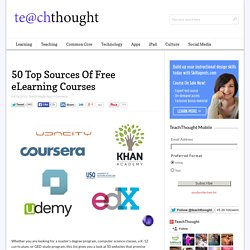
How MOOCs Could Meet the Challenge of Providing a Global Education. As online education platforms like Coursera, edX, and Udacity burst onto the scene over the past year, backers have talked up their potential to democratize higher education in the countries that have had the least access (see “The Most Important Education Technology in 200 Years”).
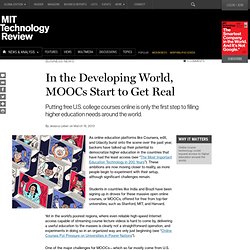
These ambitions are now moving closer to reality, as more people begin to experiment with their setup, although significant challenges remain. Students in countries like India and Brazil have been signing up in droves for these massive open online courses, or MOOCs, offered for free from top-tier universities, such as Stanford, MIT, and Harvard. Digital Learning Transition - FI. U. of California faculty union says MOOCs undermine professors' intellectual property. Faculty union officials in California worry professors who agree to teach free online classes could undermine faculty intellectual property rights and collective bargaining agreements.
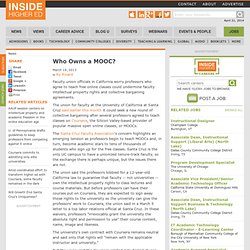
The union for faculty at the University of California at Santa Cruz said earlier this month it could seek a new round of collective bargaining after several professors agreed to teach classes on Coursera, the Silicon Valley-based provider of popular massive open online classes, or MOOCs. The Santa Cruz Faculty Association's concern highlights an emerging tension as professors begin to teach MOOCs and, in turn, become academic stars to tens of thousands of students who sign up for the free classes. Santa Cruz is the only UC campus to have a unionized tenure-track faculty, so the exchange there is perhaps unique, but the issues there are not.
The university's own contract with Coursera remains neutral and said only that rights will "remain with the applicable instructor and university. " Massive Open Online Courses Prove Popular, if Not Lucrative Yet. The co-founders, computer science professors at Stanford University, watched with amazement as enrollment passed two million last month, with 70,000 new students a week signing up for over 200 courses, including Human-Computer Interaction, Songwriting and Gamification, taught by faculty members at the company’s partners, 33 elite universities.
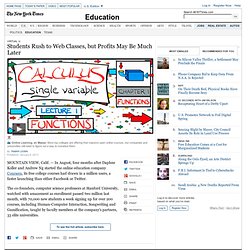
In less than a year, Coursera has attracted $22 million in venture capital and has created so much buzz that some universities sound a bit defensive about not leaping onto the bandwagon. Other approaches to online courses are emerging as well. Universities nationwide are increasing their online offerings, hoping to attract students around the world. New ventures like Udemy help individual professors put their courses online. Harvard and the Massachusetts Institute of Technology have each provided $30 million to create edX.
MOOCs on the Move: How Coursera Is Disrupting the Traditional Classroom. During the past decade, the distribution of content over the Internet and its consumption on computers and mobile devices has disrupted several industries — newspapers, book publishing, music and films, among others.
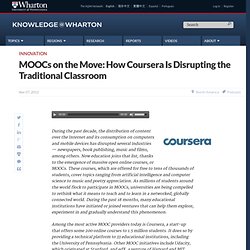
Now education joins that list, thanks to the emergence of massive open online courses, or MOOCs. These courses, which are offered for free to tens of thousands of students, cover topics ranging from artificial intelligence and computer science to music and poetry appreciation. As millions of students around the world flock to participate in MOOCs, universities are being compelled to rethink what it means to teach and to learn in a networked, globally connected world.
During the past 18 months, many educational institutions have initiated or joined ventures that can help them explore, experiment in and gradually understand this phenomenon. Among the most active MOOC providers today is Coursera, a start-up that offers some 200 online courses to 1.5 million students. How To Build MOOC's that Fail. Having started a half dozen MOOC's in the recent months, I have found most of them tend to share a common trait.
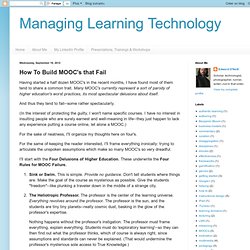
Many MOOC's currently represent a sort of parody of higher education's worst practices, its most spectacular delusions about itself. And thus they tend to fail--some rather spectacularly. (In the interest of protecting the guilty, I won't name specific courses. I have no interest in insulting people who are surely earnest and well-meaning in life--they just happen to lack any experience putting a course online, let alone a MOOC.) For the sake of neatness, I'll organize my thoughts here on four's. For the same of keeping the reader interested, I'll frame everything ironically: trying to articulate the unspoken assumptions which make so many MOOC's so very dreadful. Review of “Computational Investing, Part I” taught by Tucker Balch « the augmented trader. This is a summary of survey responses from 1,257 of the 25,589 students who enrolled in this course in Spring 2013.
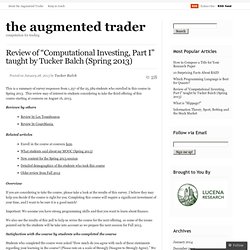
This review may of interest to students considering to take the third offering of this course starting at coursera on August 16, 2013. Reviews by others Related articles Overview. Who would you invite to an e-learning dinner party? I posed this challenge to an e-learning group on LinkedIn: ‘If you could invited anyone in the world to a dinner party who would it be?’
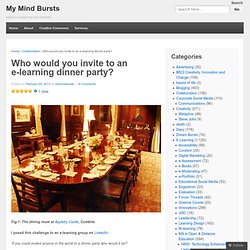
I could run this every month on a different continent and keep going for a couple of years … 12 might work better as I’d like to include a few undergraduates and graduates … perhaps guests would be asked to bring a member of their faculty, a young work colleague or inspiring student. I’ve left myself off. As the host I would be at their service. Running the event behind the scenes and enjoying the conversation before and after. How NOT to Design a MOOC: The Disaster at Coursera and How to Fix it. I don’t usually like to title a post with negative connotations, but there is no way to put a positive spin on my experience with the MOOC I’m enrolled in through Coursera, Fundamentals of Online Education: Planning and Application.
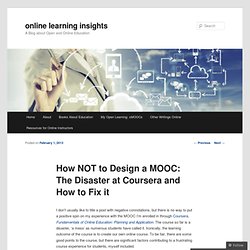
The course so far is a disaster, ‘a mess’ as numerous students have called it. Ironically, the learning outcome of the course is to create our own online course. News-of-the-Week: Coursera Professor Quits, Making Degrees Cheaper without MOOCs, and Open Data Day. In this ‘Need-to-Know’ blog post series my goal is to share noteworthy stories with readers that speak of need-to-know developments within higher education and K-12 that have the potential to influence, challenge and/or transform the traditional model of education.
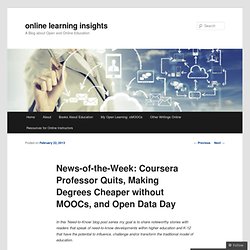
Screenshot of Coursera’s new interactive tool that shows the global student base, as well as the university partners. From Coursera’s blog. Click on the image to link to the tool on Coursera. More developments this week in the education news including Coursera’s press release [and blog post] which announced that its adding 29 schools to its roster, bringing the total to 62 schools under its umbrella, and a UC Irvine Cousera professor drops out of his own course. Need-to-Know News of the Week: A ‘Bill’ to Protect Online Students and a MOOC2Degree Program.
In this ‘Need-to-Know’ blog post series I aim to share noteworthy stories with readers that speak of developments within higher education and K-12 that have potential to influence, challenge and/or transform the traditional model of education. This week there were two interesting developments in the education news —I’ve briefly summarized each, highlighted key need-to-know points, and included links that will take readers to sites that will provide multiple perspectives on the issues. The announcements are significant enough that at some level educators will likely encounter the topics in discussions, meetings or learning communities. 1) “A Bill of Rights and Principles for Learning in the Digital Age” This ‘Bill’ released this week, was not put forth by an organization or institution as one might think, but by a group of twelve: educators, technologists and journalists including Sebastian Thrun, founder of Udacity. Further Reading: Massive List of MOOC Resources, Lit and Literati.
A list of connectivist MOOCs. The Community Course: A MOOC Alternative. Phylise Banner is the Director for Teaching and Curriculum Quality at APUS. Her work focuses primarily on the integration of the Community of Inquiry framework into faculty development initiatives, and the alignment of CTL workshop and outreach programs with effective practices in online course design and delivery. She has been working in the field of online teaching and learning since 1997, planning, designing, developing, and delivering online courses, programs, and faculty development initiatives. Massive Open Online Courses in the Developing World. When prominent U.S. universities began offering free college classes over the Web this year, more than half of the students who signed up were from outside the United States.
Consider the story of one of them: Carlos Martinez, a professor of electrical engineering at the University of El Salvador. Last spring, Martinez enrolled in a class on electronic circuits offered by edX, the $60 million collaboration between MIT and Harvard to stream “massive open online courses,” or MOOCs, over the Web. He thought it was so good that he began traveling around El Salvador to convince others to join the class and launched a blog in English to document his adventures as his country’s first “MOOC advocate.” It’s an adventure because Martinez doesn’t have the backing of his university. Online Courses Look for a Business Model. What Part of MOOC Don't You Understand? Educators who have not taken a MOOC (Massive Open Online Course) and do not understand their history, are currently writing about these courses which is causing them to be inaccurately represented in the press.
The main problem is there is all the publicity around Coursera and Edx that ignores other kinds of MOOCs. I also think part of the problem comes from the age-old issue of looking at new technologies through the lens of the old - the "horseless carriage" problem (a car is not "horseless" because it never needed one). I think an example of this is found in the essay "A New Era of Unfounded Hyperbole" by Siva Vaidhayanathan, which gives us an example of a typical misunderstanding MOOCs: "MOOCs, on the other hand, are more like fancy textbooks. Arizona universities looking at free online courses to complement traditional offerings. Monday, Nov. 19, 2012 By Danielle Verbrigghe Cronkite News Universities offering courses through Coursera and edX: edX: Harvard University Massachusetts Institute of Technology University of California Berkeley PHOENIX – Michael Hwan didn’t have to pay for the Stanford University computer science course he took online.
Gates foundation and ACE go big on MOOC-related grants.
Gates Seeks Development of Remedial Ed MOOCs. The real economics of massive online courses (essay) Every summer, the “Are college prices getting out of control?” Debate gets a boost as colleges and universities set their tuition and fees for the upcoming academic year. A Threat Or Opportunity To Universities? By Alex Zhu, Futurist, Technology Innovation, SAP. Will MOOCs Promote Superstar Teaching Over Superstar Research At Princeton And Other Ivy Universities? Photo Credit: Giulia Forsythe via Compfight. What could possibly go wrong with MOOCs? The Seven Deadly Sins as Strategy « Innovate.EDU. The next verse of the epic poem “Year of the MOOC” will almost certainly be a recounting of a fall from grace if I am correctly reading my recent discussions with dozens of institutional leaders.
Could MOOCs lead to the decline of branch campuses? MOOCs – Massive Open Online Courses – have been in the news for their potential to be revolutionary within the learning space, with significant interest coming from outside the US. For instance, nearly three-quarters of Coursera’s course-takers are international students. Innovating Education. Playing the Role of MOOC Skeptic: 7 Concerns. Site-based testing deals strengthen case for granting credit to MOOC students. MOOCs, MOCCs, and HarvardX. Essay on what MOOCs are missing to truly transform higher education. Here’s a question I’m asked more and more every day: When is Georgia Tech going to offer an undergraduate engineering degree online? Overblown-Claims-of-Failure Watch: How Not to Gauge the Success of Online Courses - Rebecca J. Rosen.
Before You Jump on the Bandwagon.... - Commentary. Pushing Through The Perils of Teaching Online. Here a MOOC, There a MOOC: But Will It Work for Freshman Composition? - Wired Campus. How EdX Plans to Earn, and Share, Revenue From Free Online Courses - Technology. New Forms of Assessment: measuring what you contribute rather than what you collect. Big MOOC Coursera Moves Closer to Academic Acceptance. Moody's: Massive open online courses carry mixed credit implications for Higher Ed 12.09. California to Give Web Courses a Big Trial. Online university for the masses! Slouching Towards Bethlehem: Unpacking the MOOC as Buzzword. Earning college credit for MOOCs through prior learning assessment. Faculty groups consider how to respond to MOOCs. Tips for college leaders to make online programs work.